Bacil Donovan Warren's Blog, page 13
December 3, 2015
Compiling In Scrivener: The Basics
Now that NaNoWriMo 2015 is over and done, many of us who participated are looking at options for reviewing and editing our works. For some, the process will involve third parties. If you wrote your novel in Scrivener, that may require you to export your document to send off to an agent, publisher, or another reviewer who doesn't use Scrivener. In that case, you will probably want to Compile the project into a different format, and then you click the Compile button … and stare blankly at all the options, settings, and output formats. It can be overwhelming!
Starting today, I'm going to go over the options in Scrivener's Compile in great detail, going over each setting and formatting option. This will probably take several blog entries, so bear with me as I get to them all!
Today, I will go over the Compile sheet, identify each of the elements, and show the various options under the first layer of the UI for this sheet.
 To start, bring up the Compile sheet in your project. To bring up this sheet, click the Compile button on the toolbar of the project, or type Command-Option-E.
To start, bring up the Compile sheet in your project. To bring up this sheet, click the Compile button on the toolbar of the project, or type Command-Option-E.
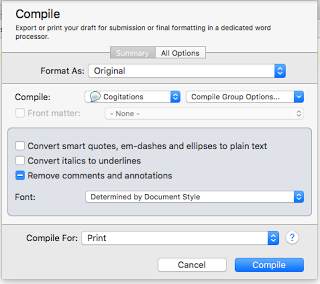 Once you have the sheet up, this is the initial default setup, the Summary. It is relatively quick and straightforward, with only a couple of options. There is the "Format As:" menu, the "Compile:" menu, the "Front Matter" checkbox and menu, a few settings checkboxes, the "Font" menu, and the "Compile For:" menu.
Once you have the sheet up, this is the initial default setup, the Summary. It is relatively quick and straightforward, with only a couple of options. There is the "Format As:" menu, the "Compile:" menu, the "Front Matter" checkbox and menu, a few settings checkboxes, the "Font" menu, and the "Compile For:" menu.
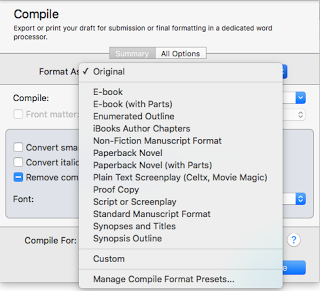
The "Format As:" menu shows all of Scrivener's basic formatting presets, and are designed each of them for a different kind of output. They are not the same as the "Compile For:" menu at the bottom. The "Format As:" menu is for selecting settings for the kind of manuscript output you want. Some of these are presets for manuscript submission for novel writers, some for creating eBooks, others for outlines or screenplays. The settings here will determine most of the settings as far as page breaks, fonts & styles, page sizes, and etc.
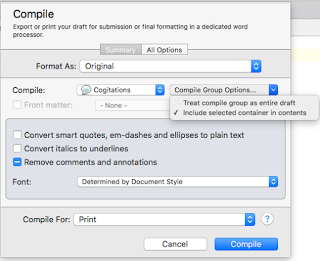 The "Compile:" menu allows you to select what parts of the current project will be included in the compile. If you are working on a novel, for example, and only want to compile one chapter or one part of the whole manuscript, you can select that here. Next to it is the Compile Group Options…" menu. Here, you tell Scrivener whether to treat the group (in this case, "Cogitations") as the entire draft. Selecting that option enables the "Front Matter" checkbox. By default, if you have selected the entire manuscript, the "Front Matter" checkbox is enabled. Also, if you select a container (a folder or other object in the Binder that contains other objects), you can deselect "Include selected container in contents" to compile only the sub-objects of that container. Here, I want the entire "Cogitations" compiled, including the actual container "Cogitations" itself.
The "Compile:" menu allows you to select what parts of the current project will be included in the compile. If you are working on a novel, for example, and only want to compile one chapter or one part of the whole manuscript, you can select that here. Next to it is the Compile Group Options…" menu. Here, you tell Scrivener whether to treat the group (in this case, "Cogitations") as the entire draft. Selecting that option enables the "Front Matter" checkbox. By default, if you have selected the entire manuscript, the "Front Matter" checkbox is enabled. Also, if you select a container (a folder or other object in the Binder that contains other objects), you can deselect "Include selected container in contents" to compile only the sub-objects of that container. Here, I want the entire "Cogitations" compiled, including the actual container "Cogitations" itself.
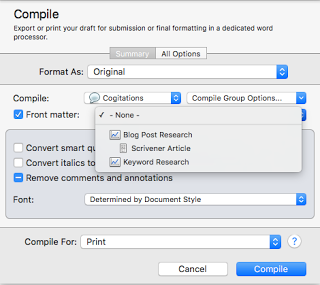 The Front Matter checkbox, if enabled, allows you to tell the compiler where to look for the Front Matter for the compiled output. Often, a project will have multiple Front Matter pages, some of which are dictated by format. Certain e-books, for example, may need to have only a title and copyright page, with no forward, while a paperback novel may also need to include acknowledgment pages, a forward, an intro, and so forth.
The Front Matter checkbox, if enabled, allows you to tell the compiler where to look for the Front Matter for the compiled output. Often, a project will have multiple Front Matter pages, some of which are dictated by format. Certain e-books, for example, may need to have only a title and copyright page, with no forward, while a paperback novel may also need to include acknowledgment pages, a forward, an intro, and so forth.
In the center are three checkboxes and the "Font:" menu. Selecting the topmost will convert smart quote, em-dash, and ellipses characters to their plain text cousins (", --, and ..., three period characters in a row) if any are present in the compiled text. The second one will change any italicized text into underlined text. The third will keep comments and annotations out of the compiled output. Finally, the "Font" menu allows you to select an output font for the compiled document. By default, this is set to be the same one used in the Style(s) defined in the document, but you can set it to any of the installed fonts.
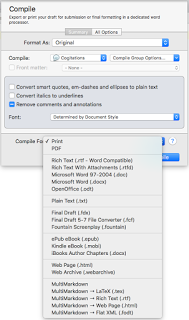 At the bottom is the "Compile For:" menu. Here, you will select what format to output. Some options include Print, PDF, .DOCX (Word), .RTF (Rich Text), .MOBI (Kindle e-book), and a whole slew of others. This controls the actual format of the output file.
At the bottom is the "Compile For:" menu. Here, you will select what format to output. Some options include Print, PDF, .DOCX (Word), .RTF (Rich Text), .MOBI (Kindle e-book), and a whole slew of others. This controls the actual format of the output file.
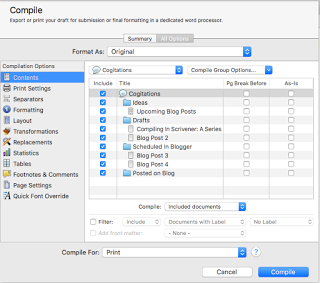
And finally, there is the "All Options" tab in the sheet. Here, you can see the very detailed set of options available to tweak and modify the output of the compiled document. The next few blog entries I make here will cover all of these items, in detail, hopefully empowering you as a writer to create the best-compiled documents that you can, ready for printing, submitting to an agent, or sending to Kindle Direct Publisher (or a host of others!) for publication.
Starting today, I'm going to go over the options in Scrivener's Compile in great detail, going over each setting and formatting option. This will probably take several blog entries, so bear with me as I get to them all!
Today, I will go over the Compile sheet, identify each of the elements, and show the various options under the first layer of the UI for this sheet.
 To start, bring up the Compile sheet in your project. To bring up this sheet, click the Compile button on the toolbar of the project, or type Command-Option-E.
To start, bring up the Compile sheet in your project. To bring up this sheet, click the Compile button on the toolbar of the project, or type Command-Option-E. Once you have the sheet up, this is the initial default setup, the Summary. It is relatively quick and straightforward, with only a couple of options. There is the "Format As:" menu, the "Compile:" menu, the "Front Matter" checkbox and menu, a few settings checkboxes, the "Font" menu, and the "Compile For:" menu.
Once you have the sheet up, this is the initial default setup, the Summary. It is relatively quick and straightforward, with only a couple of options. There is the "Format As:" menu, the "Compile:" menu, the "Front Matter" checkbox and menu, a few settings checkboxes, the "Font" menu, and the "Compile For:" menu.
The "Format As:" menu shows all of Scrivener's basic formatting presets, and are designed each of them for a different kind of output. They are not the same as the "Compile For:" menu at the bottom. The "Format As:" menu is for selecting settings for the kind of manuscript output you want. Some of these are presets for manuscript submission for novel writers, some for creating eBooks, others for outlines or screenplays. The settings here will determine most of the settings as far as page breaks, fonts & styles, page sizes, and etc.
 The "Compile:" menu allows you to select what parts of the current project will be included in the compile. If you are working on a novel, for example, and only want to compile one chapter or one part of the whole manuscript, you can select that here. Next to it is the Compile Group Options…" menu. Here, you tell Scrivener whether to treat the group (in this case, "Cogitations") as the entire draft. Selecting that option enables the "Front Matter" checkbox. By default, if you have selected the entire manuscript, the "Front Matter" checkbox is enabled. Also, if you select a container (a folder or other object in the Binder that contains other objects), you can deselect "Include selected container in contents" to compile only the sub-objects of that container. Here, I want the entire "Cogitations" compiled, including the actual container "Cogitations" itself.
The "Compile:" menu allows you to select what parts of the current project will be included in the compile. If you are working on a novel, for example, and only want to compile one chapter or one part of the whole manuscript, you can select that here. Next to it is the Compile Group Options…" menu. Here, you tell Scrivener whether to treat the group (in this case, "Cogitations") as the entire draft. Selecting that option enables the "Front Matter" checkbox. By default, if you have selected the entire manuscript, the "Front Matter" checkbox is enabled. Also, if you select a container (a folder or other object in the Binder that contains other objects), you can deselect "Include selected container in contents" to compile only the sub-objects of that container. Here, I want the entire "Cogitations" compiled, including the actual container "Cogitations" itself. The Front Matter checkbox, if enabled, allows you to tell the compiler where to look for the Front Matter for the compiled output. Often, a project will have multiple Front Matter pages, some of which are dictated by format. Certain e-books, for example, may need to have only a title and copyright page, with no forward, while a paperback novel may also need to include acknowledgment pages, a forward, an intro, and so forth.
The Front Matter checkbox, if enabled, allows you to tell the compiler where to look for the Front Matter for the compiled output. Often, a project will have multiple Front Matter pages, some of which are dictated by format. Certain e-books, for example, may need to have only a title and copyright page, with no forward, while a paperback novel may also need to include acknowledgment pages, a forward, an intro, and so forth.In the center are three checkboxes and the "Font:" menu. Selecting the topmost will convert smart quote, em-dash, and ellipses characters to their plain text cousins (", --, and ..., three period characters in a row) if any are present in the compiled text. The second one will change any italicized text into underlined text. The third will keep comments and annotations out of the compiled output. Finally, the "Font" menu allows you to select an output font for the compiled document. By default, this is set to be the same one used in the Style(s) defined in the document, but you can set it to any of the installed fonts.
 At the bottom is the "Compile For:" menu. Here, you will select what format to output. Some options include Print, PDF, .DOCX (Word), .RTF (Rich Text), .MOBI (Kindle e-book), and a whole slew of others. This controls the actual format of the output file.
At the bottom is the "Compile For:" menu. Here, you will select what format to output. Some options include Print, PDF, .DOCX (Word), .RTF (Rich Text), .MOBI (Kindle e-book), and a whole slew of others. This controls the actual format of the output file.
And finally, there is the "All Options" tab in the sheet. Here, you can see the very detailed set of options available to tweak and modify the output of the compiled document. The next few blog entries I make here will cover all of these items, in detail, hopefully empowering you as a writer to create the best-compiled documents that you can, ready for printing, submitting to an agent, or sending to Kindle Direct Publisher (or a host of others!) for publication.
Published on December 03, 2015 07:30
December 2, 2015
New blog entry on Writer's Life—Storyist guide
My latest entry in the Tools series on Writer's Life is live. It covers the application "Storyist", go check it out!
Published on December 02, 2015 15:46
November 30, 2015
New blog post—covering Ulysses—up on Writer's Life
I've got another blog entry up on WritersLife.ORG, this one covering some tips and tricks for writers using Ulyssess.
Published on November 30, 2015 15:34
November 29, 2015
5 NaNoWriMo Authors share their week 4 thoughts, on Lectitio.ME
Lectito.ME has the week 4 update from the 5 authors they've been following for NaNoWriMo 2015. Read all about it!
Published on November 29, 2015 22:58
November 28, 2015
New posts up on WritersLife.ORG
The second blog post, as well as the third, in my series for Writer's Life is up, go check them out!
Published on November 28, 2015 17:22
November 23, 2015
NaNoWriMo updates from the 5 Lectito.ME writers
Website Lectito.ME has posted their week 3 update on the 5 writers they're profiling for NaNoWriMo 2015, go have a look!
Published on November 23, 2015 11:30
Blogging for WritersLife.ORG
For the next couple of weeks, I'll be posting some blogs for writerslife.org, a website dedicated to helping writers of all kinds make the most of their craft. First post, 5 Tools For Writers: A Roundup, is up now, go check it out!
Published on November 23, 2015 09:31
November 22, 2015
NaNoWriMo Week 3 thoughts
End of week 3 of NaNoWriMo, and I can say something I've never said before about this:
I won. :D

Indeed, I had a good plan, stuck to it for the most part, and was able to write every single day. Some days, many days, I was able to write a lot more than the minimum to keep up, some days not quite as much. The key thing I've learned so far is to keep at it. Maintain the daily focus to write, even just a few hundred words, and that makes all the difference between an idea for a story, and an actual story.
I'm not finished yet. This novel still has two scenes that I haven't yet written at all, so there's work there to do yet, and a couple of the scenes I have written still need additional fleshing out in order to work right. But the vast majority of the story is there. There are important characters who died, loved, and lost. But in the end, it is all for the best.
Now comes what will probably be the harder part: revising it! Editing, I suspect, will take twice as long as did the writing part, and frankly that's okay. It is absolutely an illusion that writing flows from an author's pen or fingertips as effortlessly as sunlight streams through windswept leaves. It sucks, first. Then after being reviewed and edited, it sucks less. Then after being reviewed and edited more, it sucks even less. Et cetera, ad infinitum. Well, not quite, eventually the story either starts to really shine, or it maybe is set aside for something else. In any case, it is hard work, contrary to the romantic illusion.
Stats for the week:
Weekly word count: 14,053Weekly average/day: 2,008Total for month: 51,436
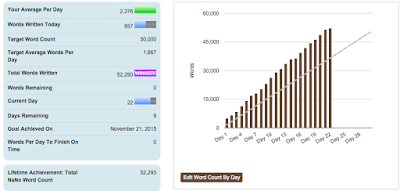
(totals are slightly different on the graphic because of the way NaNoWriMo's counter counts words, vs. how Scrivener counts them.)
Last Week's Goal Updates:
I did kill two, in fact I killed four characters (two important ones, two minor ones). Space combat is dangerous, what can I tell ya? I also did write every single day last week.
This Week's Goal Updates:
This week, I want to maintain the momentum of writing daily. I may not write as much in this work, even though I still have work to do, but I also have a freelance gig writing for another blog (details when blogs are published) so I'll also be doing that. Daily writing, of some kind, that's the goal.
Editing I am still going to wait on; I want to get all of the entire work out first. December & January seem like ideal times for that!
I'm still on track to hit 60k for the month, which would be a nice round figure—as well as a great foundation, from which to cull the best story possible.
I won. :D

Indeed, I had a good plan, stuck to it for the most part, and was able to write every single day. Some days, many days, I was able to write a lot more than the minimum to keep up, some days not quite as much. The key thing I've learned so far is to keep at it. Maintain the daily focus to write, even just a few hundred words, and that makes all the difference between an idea for a story, and an actual story.
I'm not finished yet. This novel still has two scenes that I haven't yet written at all, so there's work there to do yet, and a couple of the scenes I have written still need additional fleshing out in order to work right. But the vast majority of the story is there. There are important characters who died, loved, and lost. But in the end, it is all for the best.
Now comes what will probably be the harder part: revising it! Editing, I suspect, will take twice as long as did the writing part, and frankly that's okay. It is absolutely an illusion that writing flows from an author's pen or fingertips as effortlessly as sunlight streams through windswept leaves. It sucks, first. Then after being reviewed and edited, it sucks less. Then after being reviewed and edited more, it sucks even less. Et cetera, ad infinitum. Well, not quite, eventually the story either starts to really shine, or it maybe is set aside for something else. In any case, it is hard work, contrary to the romantic illusion.
Stats for the week:
Weekly word count: 14,053Weekly average/day: 2,008Total for month: 51,436

(totals are slightly different on the graphic because of the way NaNoWriMo's counter counts words, vs. how Scrivener counts them.)
Last Week's Goal Updates:
I did kill two, in fact I killed four characters (two important ones, two minor ones). Space combat is dangerous, what can I tell ya? I also did write every single day last week.
This Week's Goal Updates:
This week, I want to maintain the momentum of writing daily. I may not write as much in this work, even though I still have work to do, but I also have a freelance gig writing for another blog (details when blogs are published) so I'll also be doing that. Daily writing, of some kind, that's the goal.
Editing I am still going to wait on; I want to get all of the entire work out first. December & January seem like ideal times for that!
I'm still on track to hit 60k for the month, which would be a nice round figure—as well as a great foundation, from which to cull the best story possible.
Published on November 22, 2015 12:24
November 17, 2015
NaNoWriMo (Universo Responsoriis) teaser — Space Command Pilot Graduation Speech
I wasn't planning on posting any of the work I've been doing for NaNoWriMo, mostly because I was following the advice of one of my Mentors +Jamie Davis the @podmedic to just let it suck, and I'm pretty sure it does. Even if it does suck, though, I'm kinda fond of it, and thought I'd share it for feedback and just general information.
***
General Dodson stood at the front of the assembled formation, standing at attention awaiting his command. Thirty-six applicants, all highly distinguished fighter pilots from the US Air Force, US Navy & Marine Corps, Royal Air Force, Royal Canadian Air Force, Israeli Air Force, Russian Air Force, and People’s Liberation Army Air Force, had completed the selection process—more than three hundred started it—and they were being acknowledged for their accomplishment today. They were also going to get bad news: there are only four fighters scheduled for completion in the next month, so the rest of them will have to just train in simulators for at least a half year while industrial capacity catches up to demand and testing requirements.
“At Ease, ladies and gentlemen. First, allow me to be the first to officially congratulate you all on completing the initial Earth Defense Space Command fighter training class. Each of you has proven to be an amazing warrior, ready to take the fight to our mostly unknown, highly advanced adversary. You have endured months of zero-gravity flight training, suit malfunctions, planet or orbiting body reentry procedures, and you have done it with the grace, determination, and sheer power of will the human species requires of the officers who will defend it.
“Your training, of course, is not completed here. This stage is the end of the beginning; starting Monday, you will be reporting to your new squadron commands for your next steps as the tip of the spear for Space Command, leading the fight against our mysterious enemy.
“There is much we know about them: they are highly advanced, and utilize technologies that have and will continue to awe us. For all their advanced technology, and the deference we afford them for it, they have weaknesses. Some we have already uncovered, more will be evident as this war progresses. We have incorporated some of our understanding of their weaknesses into future battle planning already, and as we gain experience from conflict with them, we will exploit more; you, will exploit more. You, the men and women of class 2033-01, will be the most important part of that battle plan. We can give you all the weapons we can muster, all the technology in the universe, and it all means nothing without deliberate, planned, focused application. Your efforts will have more say in the future of humanity than will any of our engineers, software developers, architects, or generals. They are important pieces, don’t get me wrong, but without the highly trained decision makers we graduate here today taking their technology and this training—and that to come—all the technology in the world is wasted.
“Standing here in front of you, I know that our efforts will not be wasted, will not be subjected to the demands of an as-yet faceless and nameless enemy. I see the best pilots in human history, and I know that our human approach to the delivery of war to them will be the deciding factor. Humanity will survive this crisis, as it has a multitude of crises in the past, by the one thing that makes us human: our compassion, our love, our drive to succeed and to do so by lifting each other up to higher ground.
“I am proud that the initial defense of humanity is led by you. You are the latest stage of millennia of human evolution, more highly trained and focused than any that have come before you. The hopes of humans everywhere, all people on Earth today and in all the tens of thousands of years gone by and yet to come, is in your capable hands, and I wouldn’t have it any other way.”
General Dodson then stood to attention, and called out “Class, attenTION!” The class responded immediately, all of them snapping to in unison. “Earth Defense Space Command Class Twenty Thirty-Three dash Zero One, I hereby declare you to be graduated, and to take on the missions that lie before all of humanity. You must succeed. You will succeed. CLASS DISMISSED, FALL OUT!”
***
***
General Dodson stood at the front of the assembled formation, standing at attention awaiting his command. Thirty-six applicants, all highly distinguished fighter pilots from the US Air Force, US Navy & Marine Corps, Royal Air Force, Royal Canadian Air Force, Israeli Air Force, Russian Air Force, and People’s Liberation Army Air Force, had completed the selection process—more than three hundred started it—and they were being acknowledged for their accomplishment today. They were also going to get bad news: there are only four fighters scheduled for completion in the next month, so the rest of them will have to just train in simulators for at least a half year while industrial capacity catches up to demand and testing requirements.
“At Ease, ladies and gentlemen. First, allow me to be the first to officially congratulate you all on completing the initial Earth Defense Space Command fighter training class. Each of you has proven to be an amazing warrior, ready to take the fight to our mostly unknown, highly advanced adversary. You have endured months of zero-gravity flight training, suit malfunctions, planet or orbiting body reentry procedures, and you have done it with the grace, determination, and sheer power of will the human species requires of the officers who will defend it.
“Your training, of course, is not completed here. This stage is the end of the beginning; starting Monday, you will be reporting to your new squadron commands for your next steps as the tip of the spear for Space Command, leading the fight against our mysterious enemy.
“There is much we know about them: they are highly advanced, and utilize technologies that have and will continue to awe us. For all their advanced technology, and the deference we afford them for it, they have weaknesses. Some we have already uncovered, more will be evident as this war progresses. We have incorporated some of our understanding of their weaknesses into future battle planning already, and as we gain experience from conflict with them, we will exploit more; you, will exploit more. You, the men and women of class 2033-01, will be the most important part of that battle plan. We can give you all the weapons we can muster, all the technology in the universe, and it all means nothing without deliberate, planned, focused application. Your efforts will have more say in the future of humanity than will any of our engineers, software developers, architects, or generals. They are important pieces, don’t get me wrong, but without the highly trained decision makers we graduate here today taking their technology and this training—and that to come—all the technology in the world is wasted.
“Standing here in front of you, I know that our efforts will not be wasted, will not be subjected to the demands of an as-yet faceless and nameless enemy. I see the best pilots in human history, and I know that our human approach to the delivery of war to them will be the deciding factor. Humanity will survive this crisis, as it has a multitude of crises in the past, by the one thing that makes us human: our compassion, our love, our drive to succeed and to do so by lifting each other up to higher ground.
“I am proud that the initial defense of humanity is led by you. You are the latest stage of millennia of human evolution, more highly trained and focused than any that have come before you. The hopes of humans everywhere, all people on Earth today and in all the tens of thousands of years gone by and yet to come, is in your capable hands, and I wouldn’t have it any other way.”
General Dodson then stood to attention, and called out “Class, attenTION!” The class responded immediately, all of them snapping to in unison. “Earth Defense Space Command Class Twenty Thirty-Three dash Zero One, I hereby declare you to be graduated, and to take on the missions that lie before all of humanity. You must succeed. You will succeed. CLASS DISMISSED, FALL OUT!”
***
Published on November 17, 2015 11:34
November 16, 2015
NaNoWriMo updates from the 5 Lectito.ME writers
The updates for week #2, for the five writers featured on Lectito.me, are available! Head over there for the latest!
Published on November 16, 2015 16:40



